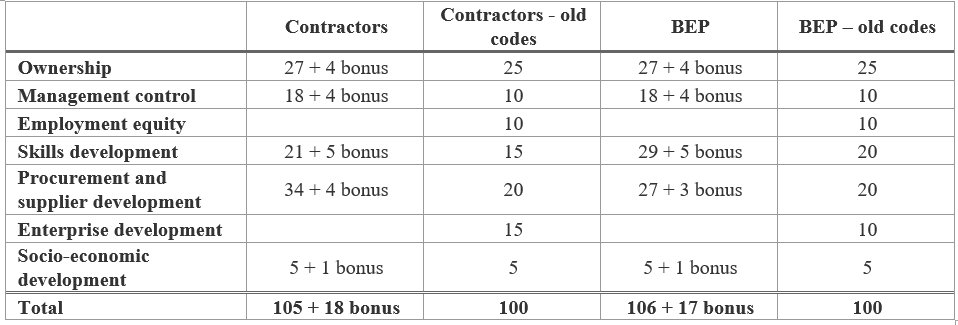The amended Construction Sector Codes were gazetted on 1 December 2017 for immediate adoption. This means that a construction company with a December year-end had to apply the amended codes with two weeks’ planning. The original construction sector codes were repealed in February 2016. Construction companies and Built Environment Professionals (BEPs) have been scored under the amended General Codes of Good Practice since that date. This limits the impact on companies scored under the amended codes. The amended codes can be downloaded here.
The points per element are summarised as follows, with a comparison to the old codes:

The following are key points noted on a review of the amended Construction Sector Code:
- Companies with certificates must report to the Construction Sector Charter Council on the verified scorecard.
- Verification agencies must ensure that their confidentiality requirements are suitably adjusted.
- Companies are measured against their South African operations only.
- Companies supplying materials to the construction sector are scored under the Amended Construction Sector Code as a Contractor.
The points per element are summarised as follows, with a comparison to the old codes:

The following are key points noted on a review of the amended Construction Sector Code:
- Companies with certificates must report to the Construction Sector Charter Council on the verified scorecard.
- Verification agencies must ensure that their confidentiality requirements are suitably adjusted.
- Companies are measured against their South African operations only.
- Companies supplying materials to the construction sector are scored under the Amended Construction Sector Code as a Contractor.
Exempted Micro Enterprises (EME) are defined as follows:

QSEs are defined as follows:

Ownership
- Rights of ownership of black people in SA multinationals are measured against the value of the South African Operations only.
- For BEPs, 50% of the total ownership must be held by people who are professionally registered in South Africa and who are Top Management of the BEP. So, if a BEP does not meet this 50% requirement, only 50% of the black ownership of the people meeting the ownership requirements may be included when measuring ownership. This has implications for the South African Operations of Multinational BEPs especially when read with the SANRAL procurement requirements that they will only do business with companies that are 51% black owned. Note that SANRAL has subsequently denied that they are restrictively applying this requirement and will judge each case on its merits.
Priority elements
Management control
- There are bonus points for exceeding targets on black directors and for black youth.
- Remuneration parity is important. Paragraph 3.7.1 of statement CSC 200 states: “The Measured Entity must strive for parity in remuneration between race groups and gender at all management levels. To this end the Measured Entry must provide full payroll access together with a copy of the Payment Parity report EEA4 to the Verification Agency during the verification. In the absence of such, the staff management levels will be declined by the verification Agency.”
- A “hidden” priority element. If you do have the staff in the right racial and gender demographics, you will not be able to train them, and run the risk of being discounted a B-BBEE level.
Skills Development
- Race and Gender demographics are applied with additional recognition for African staff. This is management-level driven
- Adjusted recognition for gender is applied when calculating training for African people and training by management level.
- Mandatory Sectoral Training is defined as site, project or safety inductions, toolbox talks and operator recertification.
- Category F and G training is limited to 35% of total skills development expenditure. Learnerships include category A training but salaries can only be claimed for B, C and D learnerships.
- Recognition for Category C learners is capped at five years.
- Skills Development includes external training of black people that are not employed by the company
- A priority element
Preferential Procurement measurement is against:
- Companies which are 51% black owned, and
- Companies which are 35% black women owned
- A priority element
Supplier Development Programmes
- These are Enterprise Development Programmes from the original construction sector codes
- A priority element
Supplier Development Contributions.
- These are Enterprise Development contributions from the original construction sector codes
If you have any B-BBEE consulting needs, please contact either Charlene Skipp on [email protected] (083 780 7209) or me on [email protected] (083 440 2130). Charlene and I can redirect queries on Employment Equity consulting.
Kind regards,

Richard Ryding
Global Business Solutions


